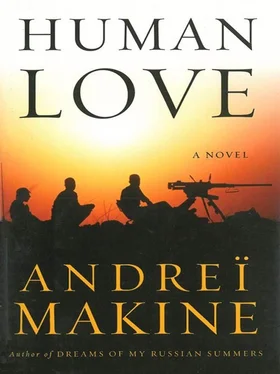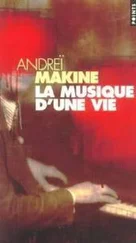I know them: she is one of the organizers of the “African Life Stories in Literature” symposium to which I have been invited; he is an artist from Kinshasa. The breasts he has finally liberated look like spheres of mozzarella. I crouch behind a planter, waiting for them to switch off the light and for pleasure to make them drowsy. My own terrace is only four or five steps away. But their lights are still on, and their bed faces the French windows: if I reached out with my arm I could almost touch the body of the man lying there, whose genitals the woman has begun to kiss.
Perhaps it was the expensiveness of their suits that caused me to take off. Whenever I find myself among these “fat-cat Africans of the international conference circuit,” I am truly amazed at the fine quality of their clothes. Just now outside the elevator it was the same astonishment, derived, no doubt, from the years of my own ragged youth long ago: What does it cost, a suit like that? A thousand dollars? More? My surprise was not new, but this time I sensed that a reaction was called for. I made for the back stairs.
The theme of the conference they are taking part in is sustainable development in Africa (our symposium is no more than a free cultural sideshow tacked on to these weighty deliberations). They had spent the afternoon in polishing their terminology: when referring to famine should one speak of “extreme poverty” or “absolute poverty”? “Undernourishment” or “malnutrition”? A good question, because aid and budgets will hinge on which terms are used. Later on, following a protracted dinner, these experts went streaming toward the elevators, laughing with the sibilant and liquid resonance of tipsy African voices, slapping one another’s palms, as if congratulating one another on a good joke. I studied their suits, of the finest wool, and the backs of their heads, which sloped down, via rolls of flesh, onto thick necks. I knew that in Africa, more than anywhere else, real life loves the grotesque. “Malnutrition,” “absolute poverty,” and those necks! Even the most fiercely radical journalist would not have dared to invent such a shocking contrast. And yet… Imagining these gleaming necks all around me in the elevator, multiplied by the mirrors, I felt nauseated, I fled.
And now I am punished, condemned to wait for a sexual act to come to fruition. From my hiding place I can just see the face of the woman crouching on all fours; her eyes are half closed, her lower jaw hangs down, revealing her tongue and teeth.
The swift mosaic of memory suddenly brings back the past of twenty-five years ago. A woman raped by soldiers, myself a prisoner, unable to move, waiting… The kaleidoscope of life replicates that night long ago in northern Angola but transforms it into farce: a plump female, the organizer of the “cultural program,” is being serviced by a young painter from Kinshasa for whom she will mount an exhibition in Paris or Brussels. While I am held prisoner between two pots of bougainvillea. I try to find it funny History repeats itself, the first time as tragedy, the second as farce. Even our own petty personal histories do it…
In the bed the woman is now lying on top of the man. She is the one doing the work; her legs can be seen heaving rhythmically. The panting grows louder; the moment of my release is at hand. I stand up, ready to leap. Then the telephone rings; the rules of vaudeville are observed right to the end. The bodies wriggling as they extricate themselves from their embrace, the woman gasping: “Sh!” Her slight cough as she tries to adopt a plausible tone of voice. Out of breath, she picks up the phone. “Hullo, Christian. Yes, it’s me. No, I haven’t been running. It’s just so hot here. You’ve no idea. Whew! Apart from that, nothing special to report, really We’re slaving away from dawn till dusk, and as usual, no one’s satisfied… Is Delphine all right? Put her on. It’s Mama, Delphinette… No, sweetheart, I haven’t seen any elephants yet. Next time. When you come here with Mama…”
I ran into them at Roissy before the flight. Christian, the husband, who had driven his wife to the airport, reminded me of a certain photograph: a pale, thin man, an old soldier marching along a muddy road. There was an element of old-fashioned ingenuousness in his look, of resignation in that drooping mustache. He had their daughter with him, the six-year-old Delphine, and while waiting at the check-in, he had talked to me about this child, “a late arrival,” and their twenty-two-year-old son. His wife was rushing about in the throng of conference guests, checking tickets, making calls on her cell phone. “She works like crazy,” Christian said to me, looking at me with his gray, unbearably honest eyes. “I don’t know how she survives – all these trips to Africa!” The child, lost in a reverie, was setting out a row of little plastic figures on a bench. Her lips were whispering an inaudible rigmarole. She looked like a little girl from bygone days with her fair pigtail, her lace collar.
“I love you, sweetheart. Night-night. Let me talk to Daddy… Look, Christian, if they haven’t made the transfer by the fifteenth, send them a note by recorded delivery and let’s see what happens… Right. I’ll call you tomorrow. I’ve got a report to write now for the delegate general. Kiss, kiss. Sleep well.” She hangs up and remains sitting on the bed for a moment, scratching her shoulder and yawning repeatedly. The man starts fiddling with the remote control, selects a football match, then changes to videos of music with a strong beat. The woman presses against him, kisses his nipples, slides toward his belly. He changes channels.
A concert. Handel, I think. The woman lifts her head, her mouth half open. The same mouth, I suddenly say to myself, that in a few days’ time will be kissing Delphinette, that little girl with the fair pigtail…
It is hard for the lovemaking to get started again. Desire has run into the sand. The woman swings heavily off the bed, makes her way toward the bathroom. Her bulk had struck me earlier as reminiscent of mozzarella. No. More like soap, very white, very lardy. Or Turkish delight. Her thick, dyed hair is the color of beets. A round face, with little watchful eyes. She is a sow, plain and simple. And yet nothing is simple. Christian, Delphinette… The bathroom door closes. The man stands in front of the television. He has gone back to the videos, swaying in imitation of the dancers’ apelike antics. I get up, slither in between the thick branches of a shrub, stretch out on my own terrace.
The southern sky. And there, above the harbor, that constellation, Lupus, the Wolf…
For a long time now the only logic in my life has been the play of coincidence, sometimes tragic, sometimes comic. As just now, when that memory of twenty-five years ago, a night of great fear in the forests of Lunda Norte, suddenly found its farcical echo: this elegant hotel in an African capital and myself captive outside the French windows of a bedroom where a fat white administrator is getting herself seen to by a young black artist. He has just stepped outside for a smoke, and from my terrace I can see his figure silhouetted against the wall.
In my youth I believed history was set in its path, and that our lives ought to be a committed response to this. I thought good and evil existed, and that the struggle between them in the modern world took the form of the class struggle. And that one should choose sides, help the weak and poor (which was precisely what I believed when, still a young man, I came to Angola), and that ones life, even if unhappy and painful, would then have a justification and follow a coherent course, structured from one phase to the next. Set down thus, all this seems somewhat naïve, and yet I lived for years guided by this naïveté. And I can no longer even remember at what moment, to put it pompously, I lost faith. The simple truth is that one day what I began to discern behind the great laws of history, the noble causes, the high-flown rhetoric, was the mischievous play of coincidence, a sly, mocking law. For this is the only logic there is: twenty-five years apart, a black woman raped by soldiers, a white woman screwed by a black man. And there outside the elevator another coincidence, a Congolese diplomat with the smooth trace of an ancient scar on his cheek, like the one on that sergeants face long ago.
Читать дальше









